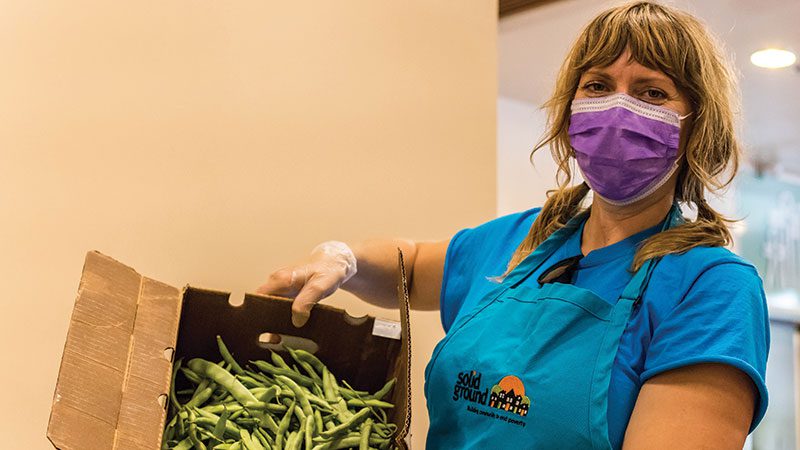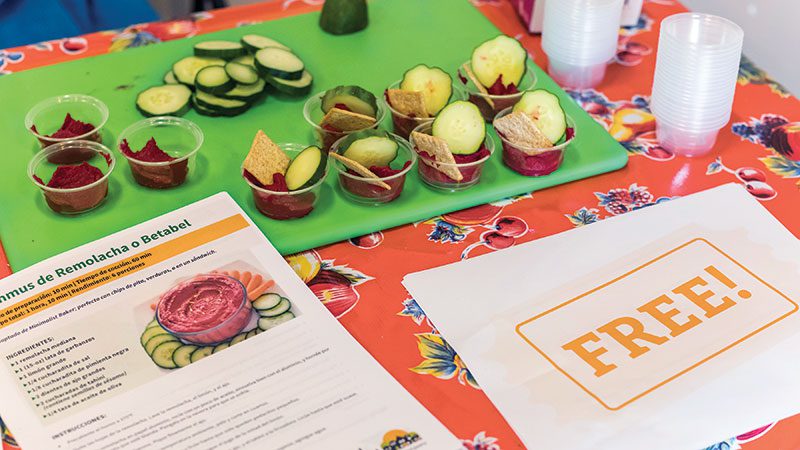Community Voices: A Conversation with Food FARMacia
This article was originally published in January 2024

PCC’s mission is to ensure that good food nourishes the communities it serves, while cultivating vibrant, local, organic food systems. We’re proud to partner with organizations throughout the region and share their stories.
Sound Consumer contributor Tara Austen Weaver recently spoke with Sarah Benson, who facilitates a unique collaboration between anti-poverty agency Solid Ground and Sea Mar Community Health Centers, a community-based organization committed to providing quality, comprehensive health, human, housing, educational and cultural services to diverse communities, specializing in service to Latinos in Washington state. The nonprofit operates more than 90 community-based health clinics. Their Food FARMacia program provides free produce to patients at two south Seattle clinics, addressing food insecurity and promoting fresh local fruits and vegetables.
Various forms of Food FARMacia programs are becoming welcomed nationwide as an important component of community health. Food is medicine, according to that concept. A recent Columbia University study suggested that allowing parents to choose free, fresh, healthy foods for their families in this way “could be one part of the solution to the nation’s growing food insecurity problem,” according to the university, and measurably improve children’s health.
Q: Can you tell us how the FARMacia got started in 2021?
A: The program started as a very basic collaboration between an urban farm that Solid Ground has in South Park [Marra Farm] and the health educators at Sea Mar Community Health Centers. As extra produce was available, the clinic health educators would pick it up and either give the produce directly to clients, or set up a table with free food. Solid Ground was able to get a grant from Healthier Here (a King County nonprofit focused on health equity) to fund the program, so the past three years we’ve grown and now work with more farms—all local or regional. It’s like a cross between a farmers market and a food pantry. We work with two Sea Mar clinics—South Park on Tuesdays, White Center on Thursdays.
A big part of the grant was funding to buy produce—specifically from BIPOC farmers. We’re working with an organization called Farmstand Local Foods, a food hub in Georgetown, and they’ve helped us connect with a number of different farms in the region. We work with Faith Beyond Farm in Kent and Alvarez Farms in Yakima, and get berries from Sidhu Farms in Puyallup. We’ve also been working with the International Refugee Committee, who has organized a collective of refugee farmers.
Q: How do people hear about the FARMacia?
A: A lot of it comes through word of mouth. One of the things the health educators do is screen for food insecurity, so they are able to let people know that this is a place they can come and pick up some fruits and vegetables. We set up in the clinic entryway, so we get some people who are just coming in for appointments. In the beginning, we would be there for several hours asking people if they wanted to take produce home, now people line up in advance.
Q: How do you decide what sort of produce to offer?
A: There’s a large Latino population, so we try some things that are culturally appropriate and also introduce some new things. Basics are always popular—onions, garlic, lettuce, tomatoes, cilantro, herbs in general. Zucchini has been super popular, but some other things that grow well in our region, like kale and winter squash, have been difficult to get people to take. There’s been a bit of learning on my end about what people want.
Q: Do you do any education around ingredients people may not be familiar with?
A: This summer we’ve developed some recipes and are doing a sampling and demo table. Each week we do a recipe of something we have a lot of. I’ll make the recipe and people can taste it as they’re standing in line—it’s opened some people’s eyes about things they might not have tried before.
We have been mindful of working with recipes that have low equipment and low ingredient needs. We do have some houseless people come through, so we want to make sure the recipes are accessible to everyone.

Q: How has the FARMacia program evolved? Are you seeing changes?
A: In the beginning of the summer, we were having to almost pull people over—“Hey, come check out our produce.” But now, honestly, we’re limited by our budget and the amount of produce we can buy. People are lined up and they just wipe stuff out. Most days we’re serving 30-45 people, but if we could it would be a much bigger number. There’s still a lot of potential to grow even more. It’s really highlighted just how much of a need there is. Our line gets longer each week.
Q: What sort of feedback do you get from Sea Mar? Are you able to collaborate with them?
A: The health educators say there are a lot of people trying to schedule appointments on FARMacia days, so they can get food when they come in. It’s a good opportunity for the health educators to have another check-in with their clients, to follow up on issues. And we’ve had a lot of opportunity to refer people who come in to other Solid Ground programs—for help with housing or transportation services.
Q: What does the future of the program look like?
A: As we’ve seen how much of a need there is, there’s a lot of conversation about how we can make this a year-round program [Food FARMacia runs June to November]. One thing we’re doing is using some of our budget to purchase refrigerators for the clinics. Sea Mar already has small food pantries with dry goods, but this is a way to be able to have fresh food. It’s not on the same scale, but it’s something. So, people can continue to get produce when they come in.
Our funding runs out this year, so we’re in the process of looking for more. In the grand vision, it would be great to expand this to more clinics. The need is definitely there—I’m hearing so many people say, “This is the first time I’ve had trouble putting food on my table.” And these are not the people you would expect—they have fulltime jobs, but it’s hard with high housing costs and medical costs. The landscape of Seattle really has shifted; this can happen to anyone.
Q: How can people get involved with helping to support the program?
A: Volunteering is one of the best ways to be involved—we can always use helping hands to keep the produce stocked, or setting up and taking down, especially as the markets have gotten busier. And if anyone wants to financially contribute through Solid Ground, that is helpful too.
How to help
For more information on SeaMar see seamar.org. To volunteer with the Food FARMacia program visit the Sea Mar website. Donations to the program can be made through Solid Ground here. Please note on the donation form that it is intended for Food FARMacia.
